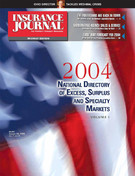As state legislatures kick into gear around the Midwest, securing favorable asbestos and tort reforms in Ohio, guarding Illinois’ healthy insurance climate and protecting the use of the Claim Loss Underwriting Exchange (CLUE) as a rating tool are the industry’s top priorities, according to lobbyists in the American Insurance Association’s Midwest regional office in Chicago.
Ohio’s tort system has become a major priority, AIA’s Steve Schneider and Sean McManamy said, especially in light of that state Supreme Court’s controversial decisions in the Scott-Pontzer v. Liberty Mutual case and others, which the men said were examples of “legislating from the bench.”
Insurance industry interests contributed nearly $200,000 to the campaign of Ohio Supreme Court Justine Maureen O’Connor last election cycle. Once elected, she helped overturn the Scott-Pontzer decision. But the industry has its eyes set on bigger targets, according to Schneider.
A major goal is asbestos reform, which was approved last year by the Ohio House of Representatives in HB 292. Another bill, SB 80, passed by the Senate last June, combines more wide-ranging tort reform with asbestos litigation reforms. With a Republican governor and Republican-led General Assembly, the chances for passage seem better than ever. (See page 10 for our interview with Ohio Director Ann Womer Benjamin.)
Schneider argued that most of the claimants now making asbestos claims are not actually sick, but only have been exposed to asbestos at some point. But those people should wait in line until the actually sick have been compensated. Schneider said HB 292 would put that principle into effect.
“Ohio has a lot of manufacturers, and a lot of people have come into contact with asbestos there,” Schneider said. “The trial bar will go out and solicit information from screeners. Everyone at some point has been exposed to asbestos. The problem is these screeners who round up everyone who may have been exposed from working in a factory. But the people who sick have to wait in line. We think people who aren’t sick should wait. If you’re sick, come forward and you will get compensated. HB 292 doesn’t place any statute of limitations on claims.”
Schneider said “the chances are very good that there will be a significant tort and asbestos reform package” to come out of Ohio. Sixty-seven companies have gone bankrupt as a direct result of asbestos liabilities, according to a RAND Institute study. The number of defendants nationally has increased from 6,000 to 8,400 in the last year, while the number of mesothelioma claims has stayed constant at 2,000 for the last decade, according to a 2002 study by Nobel laureate Joseph Stiglitz.
Meanwhile, in Illinois, the industry is playing defense. With a Democratic governor and Democratic-controlled General Assembly, business groups and insurers fear the trial bar will have a field day.
Among other bills that were batted down last session but may rise again are the Sunshine in Litigation Act, which would prevent judges from sealing court documents, and the Structural Work Act, which would give injured construction workers another avenue of compensation outside the workers’ comp system.
“There was a lot talked about last year, but nothing rally happened,” Schneider said. “A lot of Democrats said ‘We think better of this.’ But they will be back with all of these and maybe some new creative ideas.”
Without a CLUE?
While insurers seem to so far have dodged a bullet on the credit scoring issue by agreeing to modest restrictions that left the essence of the new rating and underwriting tool relatively intact, controversy over CLUE’s use in the homeowners market may call for yet more industry compromise to save a cherished new toy.
“That’ll be an issue,” McManamy admitted. Kansas Commissioner Sandy Praeger has already proposed legislation to protect consumers for being penalized under CLUE for making an inquiring with their agent about their homeowners coverage.
“Consumers should not be punished when they don’t file a claim or even have damage,” Praeger said in a statement. “We should be able to ask straightforward questions about our coverage or deductible without being penalized.”
McManamy said the issue would turn on the public’s understanding of the difference between a claim and an inquiry.
“If you call in and say you’ve got water damage, even if the company doesn’t pay the claim, it’s still a claim,” he said. “If you have water damage, you have water damage. The fact that the claim wasn’t paid doesn’t mean you’re less likely to have water damage.”
In spite of the supposed misunderstanding, McManamy said the industry has done a much better job explaining CLUE’s use a rating and underwriting tool than it did with credit-based insurance scoring.
“When people find out about what CLUE reports are how they track the history of damage to a home, they’re OK with it,” he said. “It’s very much a pro-consumer tool.” Schneider echoed the sentiment.
“Remember why CLUE exists: to prevent fraud from occurring. It does serve overall a very positive function, and saves consumers a lot of money.”
Whether politicians across the Midwest will agree is an open question.
To comment on this story, e-mail: koreilly@insurancejournal.com.
Topics Ohio
Was this article valuable?
Here are more articles you may enjoy.


 Zurich Insurance’s Beazley Bid Sets the Stage for More Insurance Deals
Zurich Insurance’s Beazley Bid Sets the Stage for More Insurance Deals  Uber Jury Awards $8.5 Million Damages in Sexual Assault Case
Uber Jury Awards $8.5 Million Damages in Sexual Assault Case  Lawyer for Prominent Texas Law Firm Among Victims ID’d in Maine Plane Crash
Lawyer for Prominent Texas Law Firm Among Victims ID’d in Maine Plane Crash  Maine Plane Crash Victims Worked for Luxury Travel Startup Led by Texas Lawyer
Maine Plane Crash Victims Worked for Luxury Travel Startup Led by Texas Lawyer 


